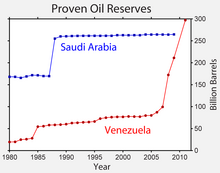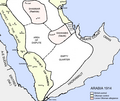
Back بوابة:السعودية Arabic بوابة:السعوديه ARZ প্রবেশদ্বার:সৌদি আরব Bengali/Bangla Ков:СаӀудийн Ӏаьрбийчоь CE دەروازە:عەرەبستانی سعوودی CKB Portal:Arabia Saudita Spanish Portail:Arabie saoudite French Portal:Arab Saudi ID Portal:Arab Saudi Malay Portaal:Saoedi-Arabië Dutch
The Saudi Arabia Portal – بوابة المملكة العربية السعودية
Saudi Arabia, officially the Kingdom of Saudi Arabia (KSA), is a country in West Asia and the Middle East. It covers the bulk of the Arabian Peninsula and has a land area of about 2,150,000 km2 (830,000 sq mi), making it the fifth-largest country in Asia and the largest in the Middle East. It is bordered by the Red Sea to the west; Jordan, Iraq, and Kuwait to the north; the Persian Gulf, Bahrain, Qatar and the United Arab Emirates to the east; Oman to the southeast; and Yemen to the south. The Gulf of Aqaba in the northwest separates Saudi Arabia from Egypt and Israel. Saudi Arabia is the only country with a coastline along both the Red Sea and the Persian Gulf, and most of its terrain consists of arid desert, lowland, steppe, and mountains. The capital and largest city is Riyadh; other major cities include Jeddah and the two holiest cities in Islam, Mecca and Medina. With a population of almost 32.2 million, Saudi Arabia is the fourth most populous country in the Arab world. (Full article...) Selected article - The proven oil reserves in Saudi Arabia are reportedly the second largest in the world, estimated in 2017 to be 268 billion barrels (4.3×10^10 m3) (Gbbl hereafter), including 2.5 Gbbl in the Saudi–Kuwaiti neutral zone. This would correspond to more than 50 years of production at current rates. In the oil industry, an oil barrel is defined as 42 US gallons, which is about 159 litres, or 35 imperial gallons. The oil reserves are predominantly found in the Eastern Province. These reserves were apparently the largest in the world until Venezuela announced they had increased their proven reserves to 297 Gbbl in January 2011. The Saudi reserves are about one-fifth of the world's total conventional oil reserves. A large fraction of these reserves comes from a small number of very large oil fields, and past production amounts to 40% of the stated reserves. Other sources state that Saudi Arabia has about 297.7 billion barrels. In 2000, the US Geological Survey estimated that remaining undiscovered oil reserves in Saudi Arabia had a probability-weighted average of 90 Gbbl. (Full article...)Did you know (auto-generated)
News
Related portalsReligions in Saudi Arabia Arab states Other countries WikiProjectsThings you can do
This is a Good article, an article that meets a core set of high editorial standards.
Faisal bin Abdulaziz Al Saud (Arabic: فيصل بن عبدالعزيز آل سعود Fayṣal ibn ʿAbd al ʿAzīz Āl Suʿūd, Najdi Arabic pronunciation: [fæjsˤɑl ben ˈʕæbd ælʕæˈziːz ʔæːl sæˈʕuːd]; 14 April 1906 – 25 March 1975) was a Saudi Arabian statesman and diplomat who was King of Saudi Arabia from 2 November 1964 until his assassination in 1975. Before his ascension, he served as Crown Prince of Saudi Arabia from 9 November 1953 to 2 November 1964, and he was briefly regent to his half-brother King Saud in 1964. He was prime minister from 1954 to 1960 and from 1962 to 1975. Faisal was the third son of King Abdulaziz, the founder of modern Saudi Arabia. Faisal was the son of Abdulaziz and Tarfa bint Abdullah Al Sheikh. His father was still reigning as Emir of Nejd at the time of Faisal's birth, and his mother was from the Al ash-Sheikh family which has produced many prominent Saudi religious leaders. Faisal emerged as an influential royal politician during his father's reign. He served as viceroy of Hejaz from 1926 to 1932. He was the Saudi foreign minister from 1930 and prime minister from 1954 until his death, except for a two-year break in both positions from 1960 to 1962. After his father died in 1953 and his half-brother Saud became king, Faisal became crown prince, and in that position he outlawed slavery in Saudi Arabia. He persuaded King Saud to abdicate in his favour in 1964 with the help of other members of the royal family and his maternal cousin Muhammad ibn Ibrahim Al ash-Sheikh, Grand Mufti of Saudi Arabia. (Full article...)Selected pictureMore did you know
General imagesThe following are images from various Saudi Arabia-related articles on Wikipedia.
Featured contentFeatured articlesGood articles
Associated WikimediaThe following Wikimedia Foundation sister projects provide more on this subject:
Sources
Discover Wikipedia using portals | ||||
© MMXXIII Rich X Search. We shall prevail. All rights reserved. Rich X Search







![Image 3A view of Jabal Sawda, a peak located in Saudi Arabia, with an elevation of around 3,000 metres (9,843 ft).[1]](http://upload.wikimedia.org/wikipedia/commons/thumb/5/59/Al_Sawda_peak.jpg/120px-Al_Sawda_peak.jpg)




















































